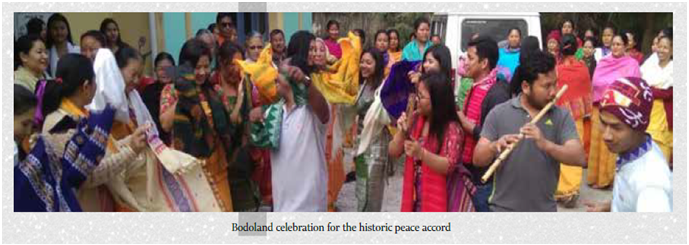
Marking an end to the 50-year-old Bodo crisis, the Union Government on 27 January 2020 in Delhi signed the historic memorandum of settlement (MoS) to bring peace and settlement with the four factions of National Democratic Front of Bodoland (NDFB), one of the dangerous militant groups in Assam, All Bodo Students’ Union (ABSU) and United Bodo People’s Organization (UBPO). This accord is said to pave the way for more development and welfare in the region bringing unity and tranquillity amongst the society. It was different that the All Bodo Students Union (ABSU) also signed the deal, who were agitating for a long time demanding for a separate Bodo state. As per the unrest going on in the region for a long time, Home Minister Amit Shah was keen to conclude the accord as early as possible to end the Bodo insurgency without hindering the territorial integrity of the state.
This is the third Bodo accord signed in the last 27 years. As per the agreement, the Centre will provide Rs 1,500-crore-assistance-package over the next three years for the development of Bodo areas with equal contribution of Rs 750 crore each from the central and state government. The first Bodo accord was signed with the All Bodo Students Union (ABSU) in 1993 leading to creation of a Bodoland Autonomous Council with limited political powers. The second pact was signed in 2003 with the militant group Bodo Liberation Tigers (BLT) leading to formation of a Bodoland Territorial Council (BTC) with four districts of Assam -- Kokrajhar, Chirang, Baska and Udalguri called the Bodoland Territorial Area District (BTAD).
The agreement provides political and economic benefits to the tribal areas without seeking a separate Bodoland state or Union Territory. The accord was signed in the presence of Home Minister Amit Shah, Assam Chief Minister Sarbananda Sonowal and four factions of the banned insurgent group National Democratic Front of Bodoland (NDFB). The NDFB factions were led by Ranjan Daimari, Govinda Basumatary, Dhiren Boro and B Saoraigra. Joint Secretary in the Home Ministry Satyendra Garg and Assam Chief Secretary Kumar Sanjay Krishna were also present on the occasion.
Union Home Minister Amit Shah, who presided over the event, terming the agreement as “historic,” he said, the new agreement, was clearly better than the agreements in 1993 and 2003, which had left the Bodos “unsatisfied” due to lack of consensus on the modalities of the previous agreements. Mr. Shah added “Today, Assam is united. Around 1500 cadres of NDFB (P), NDFB(RD) and NDFB(S) will be rehabilitated by the Centre and Assam Government. They will be assimilated in the mainstream and will surrender on January 30 on Mahatma Gandhi death anniversary. No one will be called a militant now, they all are our brothers and sisters”.
Home Minister also announced for the families of those killed during the Bodo movement would get Rs. 5 lakh each. “Final and comprehensive solution to their demands has been made, while retaining the territorial integrity of Assam. After the agreement, the NDFB factions will leave the path of violence, surrender their weapons and disband their armed organisations within a month of signing the deal”, he added.
Cases against NDFB cadres involving non-heinous crimes will be withdrawn by the Assam government, while cases involving more serious offences will be reviewed on a case-to-case basis.
Prime Minister Narendra Modi also praised the accord in a series of tweet that it would usher a new dawn of peace, harmony and togetherness. He added, “Today is a very special day for India. The Accord with Bodo groups, which has been inked, will lead to transformative results for the Bodo people. Bodo Accord stands out for many reasons. It successfully brings together the leading stakeholders under one framework. Those who were previously associated with armed resistance groups will now be entering the mainstream and contributing to our nation’s progress”.
The Assam Chief Minister Sarbananda Sonowal signing as one of the witnesses said that after the pact, different communities in the state will be able to live in harmony.
Giving the contours of the memorandum, Assam Finance Minister Himanta Biswa Sarma said, “The existing structure of the Bodoland Territorial Council (BTC) will be strengthened with more powers and seats”.

Meanwhile, people all across the Bodo-dominated region have taken to the streets and through colourful and vibrant displays filled with song and dance, have welcomed the Government’s move to fulfil many of the community’s long-standing demands. A huge rally was taken out by locals to celebrate the signing of the historic peace Accord. Many of the student organization’s members were also seen bursting firecrackers and faces beaming with joy were aplenty in the crowd that mostly consisted of Bodo youths.
Bodoland Territorial Council (BTC) was constituted to look after issues of Bodo tribes like education, horticulture and forests. However, police, general administration and revenue were controlled by the Government of Assam. The BTC was established under the 6th Schedule of the Indian Constitution.
Rashmi Mizar
To read the further articles please get your copy of Eastern Panorama February issue @http://www.magzter.com/IN/Hill-Publications/Eastern-Panorama/News/ or mail to contact @easternpanorama.in


